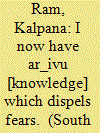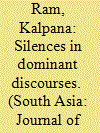|
|
|
Sort Order |
|
|
|
Items / Page
|
|
|
|
|
|
|
| Srl | Item |
| 1 |
ID:
092217


|
|
|
|
|
| Publication |
2009.
|
| Summary/Abstract |
During the 1980s and 1990s, I developed a familiarity with a very specific sub-culture in Tamil Nadu-the Catholic fishing communities of Kanyakumari, who live in a string of sandy villages stretching from the Cape itself, up to the border with Kerala. I was at this point particularly interested in popular religion and its construction of the female body. Following on from that interest, and set off against the backdrop of a familiarity with the social life of these villages, I began a series of wide-ranging sets of interviews with women I already knew on the ways they framed their experiences of puberty and maternity. The interviews threw up, as I had suspected, an intersecting range of discursive frames. And the book I will eventually bring out on this topic will be as much about the relationship between different kinds of intellectuals and rural people as it will be about female experiences per se. The interviews were deliberately conducted with those active in non-government organisations (NGOs) run by Catholic organisations in the district, as well as with school teachers, priests, midwives and healers of different kinds, with doctors, as well as with ordinary women from different age sets.
|
|
|
|
|
|
|
|
|
|
|
|
|
|
|
|
| 2 |
ID:
137265


|
|
|
|
|
| Summary/Abstract |
Subaltern Studies continues to be generative for understanding the present, provided we expand our evaluation beyond the question of ‘who is subaltern?'. This paper considers instead underlying methodological orientations that outlive their original empirical context, lending themselves to fresh applications. The original method trained us to notice gaps in governmental discourse, silences that underlie its claims to know and administer all within its domain. Based on ethnographic work in rural south India, the paper argues that despite the radical expansion of governmental discourse, it still does not coincide with the everyday practices people continue to inhabit. These practices shape, for example, rural women's everyday poesis in the stories they tell of injustices they have suffered, and the way these injustices erupt as disorder in the body's relationship to the world. To be able to write about these silences minimally requires, however, a second orientation, also present in early Subaltern Studies. This is the underlying epistemic confidence that it is possible, despite the odds, to understand better the meanings and workings of practices that may no longer constitute coherent or self-sufficient worlds—but which nevertheless continue to enjoy a vital and lively presence for subalterns, and for us all.
|
|
|
|
|
|
|
|
|
|
|
|
|
|
|
|
|
|
|
|
|